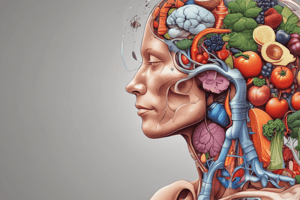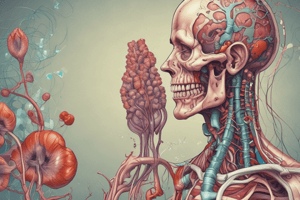Podcast
Questions and Answers
What is the primary function of carbohydrates in the body?
What is the primary function of carbohydrates in the body?
- Regulating body temperature
- Building and repairing tissues
- Helping absorb vitamins
- Providing energy for the body (correct)
Which of the following is an example of a protein?
Which of the following is an example of a protein?
- Triglyceride
- Fiber
- Starch
- Casein (correct)
What is the main function of fats in the body?
What is the main function of fats in the body?
- Providing energy and building tissues
- Helping absorb vitamins and providing energy (correct)
- Maintaining proper bodily functions and providing energy
- Regulating body temperature and aiding digestion
What percentage of an adult's body weight is made up of water?
What percentage of an adult's body weight is made up of water?
What is the primary function of fiber in the body?
What is the primary function of fiber in the body?
Which of the following is an example of a phytochemical?
Which of the following is an example of a phytochemical?
What is the primary function of vitamins in the body?
What is the primary function of vitamins in the body?
Which of the following is an example of a mineral?
Which of the following is an example of a mineral?
What is the primary function of additives in food?
What is the primary function of additives in food?
Flashcards are hidden until you start studying
Study Notes
Macronutrients
- Carbohydrates:
- Provide energy for the body
- Found in: grains, fruits, vegetables, dairy products, and sugary foods
- Examples: starches, sugars, and fiber
- Proteins:
- Build and repair tissues in the body
- Found in: animal products (meat, poultry, fish, eggs, dairy), legumes, nuts, and seeds
- Examples: casein, whey, and gluten
- Fats:
- Provide energy and help absorb vitamins
- Found in: animal products, oils, nuts, and seeds
- Examples: triglycerides, cholesterol, and phospholipids
Micronutrients
- Vitamins:
- Essential for various bodily functions
- Found in: fruits, vegetables, whole grains, and animal products
- Examples: Vitamin A, Vitamin C, and Vitamin D
- Minerals:
- Important for maintaining proper bodily functions
- Found in: fruits, vegetables, whole grains, and animal products
- Examples: calcium, iron, and potassium
Water and Fiber
- Water:
- Essential for bodily functions, such as temperature regulation and digestion
- Makes up approximately 60% of an adult's body weight
- Fiber:
- Important for digestive health and satiety
- Found in: whole grains, fruits, and vegetables
Other Components
- Phytochemicals:
- Plant-derived compounds with potential health benefits
- Examples: antioxidants, flavonoids, and carotenoids
- Additives:
- Substances added to food to enhance flavor, texture, or appearance
- Examples: preservatives, sweeteners, and colorants
Studying That Suits You
Use AI to generate personalized quizzes and flashcards to suit your learning preferences.




